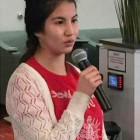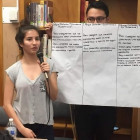
I’m Proof Kids Don’t Need Extreme Sentences to Pay Debt
|
By the time I was 12, I had been kicked out of two schools because of my violent outbursts. No one ever tried to find out why I was violent.
Juvenile Justice Information Exchange (https://jjie.org/page/215/)

In late September, Torri was driving down the highway with her 11-year-old son Junior in the back seat when her phone started ringing.
It was the Hamilton County Sheriff’s deputy who worked at Junior’s middle school in Chattanooga, Tennessee. Deputy Arthur Richardson asked Torri where she was. She told him she was on the way to a family birthday dinner at LongHorn Steakhouse.
“He said, ‘Is Junior with you?’” Torri recalled.
Earlier that day, Junior had been accused by other students of making a threat against the school. When Torri had come to pick him up, she’d spoken with Richardson and with administrators, who’d told her he was allowed to return to class the next day. The principal had said she would carry out an investigation then. ProPublica and WPLN are using a nickname for Junior and not including Torri’s last name at the family’s request, to prevent him from being identifiable.
When Richardson called her in the car, Torri immediately felt uneasy. He didn’t say much before hanging up, and she thought about turning around to go home. But she kept driving. When they walked into the restaurant, Torri watched as Junior happily greeted his family.
Soon her phone rang again. It was the deputy. He said he was outside in the strip mall’s parking lot and needed to talk to Junior. Torri called Junior’s stepdad, Kevin Boyer, for extra support, putting him on speaker as she went outside to talk to Richardson. She left Junior with the family, wanting to protect her son for as long as she could ...

By the time I was 12, I had been kicked out of two schools because of my violent outbursts. No one ever tried to find out why I was violent.

In the push to get schools to stop releasing high school disciplinary records to colleges as part of the college admissions process, a Denver-based nonprofit called Padres & Jõvenes Unidos is on the front lines.

“There’s a bias effect,” Sinocruz said. “If I see a student has been disciplined three times for ‘insubordination,’ ‘disrespect,’ some of these categories that are overly vague and capture very minor incidents, it’s hard not to look at the students as somehow disrespectful, even if it was for a minor thing.
“A lot of times the categories that are used are much stronger, much more punitive-sounding than what actually happened.”
Learn how juvenile justice and child welfare policies and practices disproportionately affect young people of color, and how to combat structural racism in child serving systems, among other topics.
More than 50 people sentenced to life in prison in Arkansas when they were younger than 18 could get those sentences reconsidered, thanks to a new court decision.
The Arkansas Supreme Court ruled Friday that a U.S. Supreme Court decision three years ago applies retroactively in the state, the Arkansas Democrat-Gazette reported.
Who am I? I am but only one of thousands of people who was a child prosecuted as an adult — then sentenced to rot inside a living tomb until I die.
My name is Tony Farrell, and I am fighting for my life.
WASHINGTON — Shackling young people in court makes court proceedings less fair and also fails to make courtrooms any safer.

Through comedic hijinks and some explicit visuals of drugs, guns and a scantily clad woman, “Dope” opens the eyes of viewers to the challenging lives many of our urban youths experience while trying desperately not to get trapped in a waterfall of stereotypes and statistics.